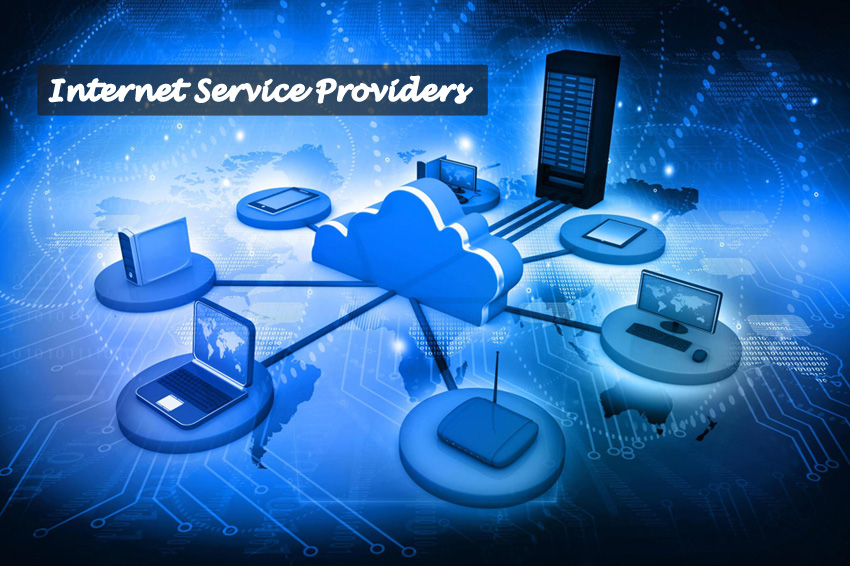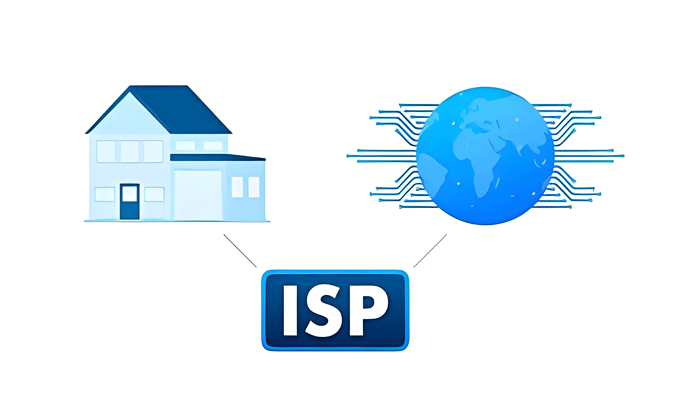The internet is a fun place like a giant playground! There are videos, games, and friends to chat with online. But to get in, you need a ticket. That’s where your ISP comes in! They act like a gatekeeper, checking your ticket and letting you enter the playground. With your ISP, you can watch videos, play games, and chat with friends all you want! Knowing how ISPs work is like learning the playground rules. It helps you have a safe and fun time online!
Quick Links
- ISP Meaning
- Types of ISPs
- How ISPs Work
- Key Players in the ISP Industry
- Factors to Consider When Choosing an ISP
- Common Issues with ISPs
- The Evolution of ISP Technology
- Impact of ISPs on Internet Access Worldwide
- Tips for Improving Internet Speed from ISPs
- Security Concerns with ISPs
- ISP Regulations and Policies
- The Importance of a Reliable ISP for Businesses
- ISP Comparison Guide
- Future Innovations in ISP Technology
ISP Meaning

ISP, or Internet Service Provider, refers to an entity that provides internet services to users. The ISP acts as the bridge between your home or business and the internet, facilitating your access to websites, emails, and online services. It’s essentially the service that keeps you connected to the vast world of information.
Types of ISPs
There’s more to ISPs than meets the eye. Broadband, DSL, satellite, and fiber-optic ISPs cater to diverse user needs. Each type has its advantages and limitations, shaping the internet experience for users worldwide.
1. Broadband ISPs
Widely recognized for high-speed internet, broadband ISPs operate by transmitting data through multiple channels, paving the way for quicker and more dependable connections. This type of ISP is often favored for activities demanding substantial bandwidth, such as streaming, online gaming, and video conferencing.
2. DSL ISPs
Digital Subscriber Line (DSL) ISPs ingeniously utilize existing telephone lines to deliver internet access with a blend of decent speed and reliability. This makes DSL an accessible option for users seeking a reliable connection without the need for extensive infrastructure changes.
3. Satellite ISPs
Catering to the needs of remote areas, satellite ISPs harness satellite signals to provide internet access where traditional options may be scarce. This technology ensures that even in the most secluded locations, users can stay connected, bridging the digital gap for those in less accessible regions.
4. Fiber-optic ISPs
Harnessing the power of advanced optical fibers, fiber-optic ISPs deliver internet speeds that can only be described as lightning-fast. This technology has become a preferred choice for many users, especially in urban areas, as it offers unparalleled speed and reliability. Fiber-optic ISPs are particularly suited for bandwidth-intensive activities and multiple connected devices.
How ISPs Work

Delving into the technicalities, ISPs transmit data packets, establish connections, and manage the intricate web of routing and switching. It’s a complex dance that happens in the background every time we hit ‘enter’ in our browsers.
1. Transmission of data packets
At the core of ISP operations is the breakdown of data into packets before it traverses the internet. This process ensures efficient and seamless communication by dividing information into manageable chunks. Think of it like dividing a large book into smaller chapters for easier transport.
2. Connection establishment
Establishing a connection involves your device communicating with the ISP’s servers. This interaction creates a pathway for data to flow between your device and the broader internet. It’s akin to your device asking the ISP, “Hey, can I access the internet?” and the ISP responding, “Sure, let me set up a pathway for you.”
3. Routing and switching
Once a connection is established, ISPs play a crucial role in determining the best route for your data to travel. Imagine your data as a package that needs to reach its destination. ISPs act as navigators, deciding the fastest and most efficient path through the vast network of interconnected devices. This ensures your data reaches its destination quickly and accurately, akin to a GPS guiding a driver to the optimal route.
Key Players in the ISP Industry
From global giants to local heroes, the ISP industry has key players shaping the digital landscape. Knowing who provides your internet connection is essential for understanding the quality of service you can expect.
1. Major ISPs globally
Companies like Comcast, AT&T, and Verizon are major players globally, providing internet services to millions of users, influencing the internet landscape on an international scale. Recognizing their dominance helps users comprehend the substantial impact these companies have on the provision of internet services worldwide.
2. Local and regional ISPs
Local and regional ISPs hold significant sway in specific geographic areas, these smaller players provide tailored services, addressing the unique needs of local communities. Their localized approach ensures a more personalized and community-centric internet experience, contributing to the diversity within the ISP industry.
Factors to Consider When Choosing an ISP

Choosing an ISP is not a one-size-fits-all scenario. Speed, reliability, customer support, and pricing are critical factors to weigh when making this important decision.
1. Speed and bandwidth options
Consider your internet usage and choose an ISP that provides sufficient speed and bandwidth for your needs.
2. Reliability and uptime
A reliable ISP ensures minimal downtime, keeping you connected when you need it the most.
3. Customer support
Good customer support is crucial; it helps resolve issues promptly and ensures a smooth internet experience.
4. Pricing and contracts
Evaluate pricing structures and contract terms to find an ISP that fits your budget and preferences.
Common Issues with ISPs

Not all ISP experiences are smooth sailing. Speed throttling, downtime, and customer service complaints can plague users. Knowing how to navigate these issues is crucial for a frustration-free internet experience.
1. Speed throttling
Some ISPs may intentionally slow down your internet speed, a practice known as speed throttling. Understanding this can help you address the issue. Speed throttling often occurs during peak usage times or due to specific online activities. To tackle this, consider reaching out to your ISP to discuss your concerns, explore alternative plans that offer higher speeds, or utilize tools to monitor and test your internet speed. Being informed empowers you to advocate for a consistent and reliable internet connection.
2. Downtime and outages
Periods of downtime can be frustrating; knowing how to report outages and seeking compensation if necessary is important. If you experience frequent or prolonged outages, report the issue to your ISP promptly. Some ISPs may offer compensation for extended service interruptions. Additionally, staying informed about scheduled maintenance or upgrades can help you anticipate potential downtime and plan accordingly. Exploring backup internet options, such as mobile hotspots, can provide temporary relief during outages.
3. Customer service complaints
Be aware of common customer service complaints and choose an ISP with a positive reputation for customer support. Customer service is a vital aspect of the ISP experience, and selecting a provider known for responsive and helpful support can make a significant difference. Research customer reviews, ask for recommendations, and inquire about the ISP’s support channels and response times. In case of issues, having a reliable customer service team can streamline problem resolution and enhance your overall satisfaction with your internet service.
4. Equipment Compatibility
Issues can arise if your equipment is not compatible with your ISP’s network. Ensure that your modem, router, and other devices meet the specifications recommended by your ISP. Outdated or incompatible equipment can hinder your internet speed and overall performance. Regularly check for firmware updates for your devices and install them to maintain optimal compatibility. If needed, consult your ISP for advice on upgrading or replacing equipment to better align with their network requirements.
5. Understanding Data Caps
Some ISPs impose data caps, limiting the amount of data you can use within a billing cycle. Exceeding these caps may result in additional charges or reduced speeds. Be aware of your ISP’s data policies and monitor your usage to avoid unexpected consequences. If your internet activities regularly approach or surpass the data cap, consider exploring plans with higher data allowances or unlimited data options to better suit your needs.
The Evolution of ISP Technology

From the nostalgic days of dial-up to the lightning-fast speeds of today, the evolution of ISP technology has been remarkable. Exploring this journey provides insights into the future trends awaiting us.
1. From dial-up to high-speed internet
Cast your mind back to the days of dial-up internet—the beeping, the waiting, the limited speed. Technological advancements have dramatically changed the game, bringing us high-speed internet that has transformed how we connect and interact online. The transition from sluggish dial-up to swift broadband and fiber-optic connections has not only increased speed but has also opened up possibilities for seamless streaming, online gaming, and enhanced communication experiences.
2. Future trends in ISP technology
The journey of ISP technology doesn’t stop at high-speed internet. Exciting future trends are on the horizon, shaping the way we access and experience the online world. Keep an eye on developments such as 5G technology, which promises faster speeds and improved connectivity, making activities like downloading large files or streaming high-quality content even more efficient. Additionally, explore emerging space-based internet solutions, aiming to provide internet access globally, bypassing traditional infrastructure limitations.
These advancements hint at a future where internet access is not only faster but also more accessible and reliable, breaking barriers and connecting the world in unprecedented ways. As technology continues to evolve, the landscape of ISP technology is poised for even more transformative changes, enhancing our digital experiences in ways we may have yet to imagine.
Impact of ISPs on Internet Access Worldwide
ISPs play a crucial role in bridging the digital divide, providing internet access to underserved communities and reducing inequalities. Examining their social and economic impact reveals how they shape the way we connect and communicate on a global scale.
ISPs help people in far-off and rural areas get the internet, linking them to the world. This is super important because it means even folks who live in distant spots can now learn, work, and connect online. Getting internet to these places doesn’t just make life better for the people there, but it also brings new chances for jobs and lets them share their culture with others. So, thanks to ISPs, the internet isn’t just for people in big cities – it’s for everyone, no matter where they live. This way, the internet helps make our world more connected and fair for everyone.
Tips for Improving Internet Speed from ISPs

Dealing with sluggish internet? Don’t worry! Here are some straightforward tips to troubleshoot common issues and make your online experience smoother.
1. Basic Troubleshooting
Simple steps like restarting your router or identifying and removing possible interference can often give your internet speed a quick boost. These easy fixes can make a big difference. If you’re facing connectivity issues, try turning off and on your router. It might sound simple, but it can reset your connection and improve speed. Additionally, check for electronic devices nearby that could be causing interference, as this can impact your Wi-Fi signal.
2. Keep Things Updated
Regularly updating your devices and networking equipment is essential. This ensures they work well with the latest technologies, making your internet experience faster and more reliable. Think of it like giving your internet connection a little tune-up for better performance. Check for updates on your computer, smartphone, and any other devices you use for internet access. Also, make sure your router’s firmware is up to date; manufacturers often release updates to improve performance and security.
3. Optimize Wi-Fi Settings
If you’re using Wi-Fi, optimizing your settings can significantly improve internet speed. Make sure your router is placed in a central location to ensure a more even distribution of the Wi-Fi signal. Use strong passwords to secure your network and limit unauthorized access, which can slow down your internet speed. Consider changing the Wi-Fi channel if you live in a crowded area where multiple networks may interfere with each other.
4. Evaluate Your Internet Plan
Sometimes, slow internet speed might be due to the limitations of your current internet plan. Check with your ISP to see if there are higher-speed plans available in your area. Consider upgrading your plan if you consistently require faster speeds, especially if you have multiple devices connected simultaneously or engage in activities like online gaming or streaming.
5. Reduce the Number of Connected Devices
Having too many devices connected to your network can strain your internet speed. Disconnect devices that are not in use or prioritize your network usage. If you’re experiencing slow speeds during specific activities, like video calls or gaming, try disconnecting other devices to see if it makes a difference.
6. Use a Wired Connection
While Wi-Fi is convenient, a wired connection can provide a more stable and faster internet connection. If possible, connect your computer or gaming console directly to the router using an Ethernet cable. This can eliminate potential Wi-Fi-related issues and ensure a more reliable connection for bandwidth-intensive tasks.
By following these tips, you can troubleshoot common issues and optimize your internet experience for faster, more reliable connectivity.
Security Concerns with ISPs

Data privacy and protection against cyber threats are growing concerns. Understanding the potential risks and safeguarding your online presence is crucial in the digital age.
1. Data Privacy Issues
ISPs play a crucial role in managing a substantial amount of your data. Understanding their privacy policies is key to safeguarding your personal information. Familiarize yourself with the type of data your ISP collects, how it’s stored, and whether it’s shared with third parties. Stay informed about the duration of data retention and the steps your ISP takes to protect your privacy. Additionally, consider using encryption tools and virtual private networks (VPNs) to add an extra layer of security to your online activities.
2. Protecting Against Cyber Threats
Educating yourself about common cyber threats is fundamental to fortifying your digital defenses, and your ISP is an integral part of this defense mechanism. ISPs employ various measures to protect your data from potential security breaches, such as implementing firewalls and intrusion detection systems. Stay updated on the security features your ISP provides and consider enabling additional security services if available. Regularly update your antivirus software and conduct periodic security audits to ensure your devices are protected against the latest threats.
3. Secure Connection Practices
Ensuring a secure connection is vital for protecting sensitive information during online transactions and communications. Always use secure, encrypted connections when accessing websites or conducting financial transactions. Look for “https://” in the URL, indicating a secure connection. Avoid connecting to public Wi-Fi networks for sensitive activities, as these networks may lack proper security measures, making your data vulnerable to interception.
4. Regular Monitoring and Reporting
Stay vigilant by regularly monitoring your online accounts and promptly reporting any suspicious activities to your ISP. Many ISPs offer tools and services that allow you to monitor your internet traffic and receive alerts for unusual behavior. Take advantage of these features to identify and address potential security threats promptly.
5. Customer Support Communication
Establish open communication with your ISP’s customer support regarding security concerns. Inquire about the security features they provide, seek guidance on optimizing your online security, and report any unusual experiences promptly. A collaborative approach between users and ISPs can contribute to a more secure online environment.
6. Legal Protections and Regulations
Familiarize yourself with the legal protections and regulations governing data privacy in your region. Understand your rights concerning the collection, use, and protection of your personal data by your ISP. Stay informed about any changes in regulations that may impact your online privacy and security, and advocate for robust data protection measures.
Addressing security concerns with ISPs involves a combination of user awareness, proactive measures, and collaboration with service providers.
ISP Regulations and Policies
Net neutrality and government oversight impact how ISPs operate. Unraveling the regulatory landscape provides insights into the forces shaping the internet we know today.
1. Net neutrality
Net neutrality stands as a cornerstone principle, ensuring that ISPs treat all online content equally. This means they cannot prioritize certain websites or services over others, promoting an open and fair internet environment. By upholding net neutrality, ISPs contribute to a level playing field where all online content, regardless of its source or nature, has an equal opportunity to reach users. This principle fosters innovation, competition, and a diverse online experience for consumers.
2. Government oversight
Government regulations and oversight act as crucial guardians, ensuring that ISPs operate fairly and transparently. These regulations are in place to safeguard consumer interests, prevent anti-competitive practices, and maintain a healthy digital marketplace. By providing a regulatory framework, governments aim to strike a balance that encourages healthy competition among ISPs while protecting consumers from potential abuses of power. Oversight mechanisms also help address issues such as privacy concerns, data security, and the provision of accurate information about internet services.
3. Consumer Protection
Government oversight extends to the realm of consumer protection, where regulations are designed to ensure that ISPs deliver the services they promise. This involves transparency in advertising, accurate representation of internet speeds, and fair business practices. Consumer protection measures empower users by holding ISPs accountable for the quality and reliability of the services they provide, contributing to a more trustworthy and accountable internet ecosystem.
4. Digital Inclusion and Accessibility
Government regulations can also influence initiatives related to digital inclusion and accessibility. Policymakers may implement measures to bridge the digital divide, ensuring that internet services are accessible to all segments of society. This includes considerations for rural areas, underserved communities, and economically disadvantaged populations. By addressing disparities in internet access, governments contribute to creating a more inclusive and equitable digital landscape.
5. Emerging Technologies and Future Regulations
As technology evolves, so do the challenges and opportunities in the digital space. Governments play a critical role in adapting regulations to address emerging technologies, such as 5G networks, artificial intelligence, and the Internet of Things (IoT). Crafting forward-looking regulations ensures that the regulatory framework remains relevant, fostering innovation while mitigating potential risks associated with new technologies.
The Importance of a Reliable ISP for Businesses

For businesses, a reliable ISP is more than a convenience – it’s a necessity. The impact on productivity and choosing the right ISP tailored to business needs cannot be overstated.
1. Impact on productivity
For businesses, a reliable ISP is indispensable for sustaining productivity levels. It plays a pivotal role in ensuring seamless communication among team members and supporting various online operations critical to daily business functions. From sending crucial emails to conducting video conferences, a stable and high-speed internet connection is the backbone of a productive work environment.
2. Choosing the right ISP for business needs
When it comes to selecting an ISP for your company, it’s essential to consider business-specific requirements. Look for features like dedicated support and service level agreements (SLAs) that cater to the unique demands of business operations. A dedicated support team ensures swift resolution of any connectivity issues, minimizing downtime and ensuring that your business functions smoothly. SLAs provide a clear understanding of the service commitments, helping you make an informed decision based on your business’s specific needs.
3. Scalability and Reliability
Businesses evolve and grow, and a reliable ISP should be able to scale along with your company. Ensure that the chosen ISP has the capacity to handle increased data demands and user numbers as your business expands. Reliability is paramount; a dependable ISP minimizes the risk of disruptions, ensuring that your business operations remain uninterrupted, even during peak usage times.
4. Security Considerations
Security is a top priority for businesses, especially when it comes to internet connectivity. A reliable ISP should offer robust security features, including firewalls, encryption, and secure networks. This is crucial for protecting sensitive business data and maintaining the integrity of online transactions, safeguarding your company against potential cyber threats.
5. Cost-Effectiveness
While reliability is key, it’s also important to consider the cost-effectiveness of the chosen ISP. Assess the pricing structure, taking into account the features, support, and scalability offered. Striking a balance between reliability and affordability ensures that your business gets the best value for its investment in internet services.
6. Future-Proofing Your Connectivity
Technology is ever-changing, and it’s vital to choose an ISP that can adapt to future technological advancements. Future-proofing your connectivity ensures that your business stays ahead in a rapidly evolving digital landscape. Look for ISPs that invest in upgrading their infrastructure and technologies to meet the growing demands of businesses and emerging digital trends.
ISP Comparison Guide
With a myriad of options available, comparing ISPs is essential. User reviews and ratings provide valuable insights into the strengths and weaknesses of different providers.
Popular ISPs and their features
Compare popular ISPs, taking into account their features, customer reviews, and overall reputation in the market.
User reviews and ratings
User reviews and ratings provide valuable insights into the real-world experiences of other customers, helping you make an informed decision.
Future Innovations in ISP Technology

The future of ISP technology holds promises of 5G connectivity and space-based solutions. Exploring these innovations gives a glimpse into the exciting possibilities awaiting internet users.
5G and beyond
The upcoming 5G technology promises faster speeds and improved connectivity, revolutionizing the way we experience the internet.
Space-based internet solutions
Explore the possibilities of space-based internet solutions, which involve deploying satellites to provide internet access globally.
Conclusion
The internet world is always changing, so it’s important to understand how internet providers (ISPs) work. This is true for everyone, whether you just use the internet for fun or your business needs a fast and reliable connection. Knowing about ISPs can help you choose the best one for your needs and avoid any problems.
When you purchase through links on our site, we may earn an affiliate commission. Read our Affiliate Policy.





